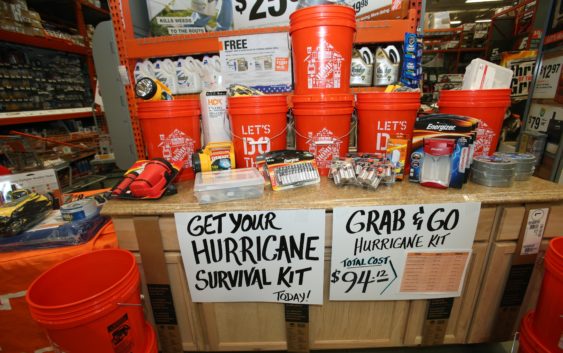- National memorial to honor NC firefighter who died on duty during Hurricane Helene
- Gov. Josh Stein extends State of Emergency for western NC wildfires
- Governor Stein extends state of emergency for NC wildfire threat
- Governor Stein extends emergency in 34 NC counties amid wildfire threat
- Texans can buy emergency preparation supplies tax-free April 26-28 ahead of severe weather season
Getting prepared — the supplies you need for a hurricane

How to prepare before the storm hits:
Necessities
Water. One gallon per person, per day — prepare for a minimum of three days. Battery-operated television or radio. Extra batteries Manual can opener Local maps Flashlights and waterproof matches Cell phone with chargers, inverter or solar charger Toilet paper Baby supplies Cash (ATMs may not work after the storm) Rain gear/hat Bleach or water-purification tablets Soap and detergent Moist towelettes, garbage bags and plastic ties for personal sanitation. Charcoal/lighter fluid or portable camping stove Disposable plates, glasses and utensils Ice chest and ice Valuable papers — insurance information, passports, Social Security cards, bank account and credit card numbers, wills, deeds, etc. — or copies, in a waterproof bag Prescription and other necessary medicines Blankets, tarp and masking tape Dust mask to filter contaminated air, plastic sheeting and duct tape. Three day’s worth of clothing, sleeping bags First-aid kit: aspirin or pain reliever, anti-diarrhea medication scissors, tweezers, bug spray Feminine supplies and personal hygiene items Fire extinguisher — ABC type Extra pair of eyeglasses Extra house, car keys Tools: Shut-off wrench, pliers Needles, thread Whistle Signal flare Games, books for entertainment Pet care: leashes, pet carriers, food Sunscreen and sunglasses Food:
Baby food, baby formula, powdered milk Canned meats (Spam, chicken, ham) Canned fish (tuna, sardines) Canned meals: spaghetti, soup, stew, chili Canned fruits and vegetables Cereal, crackers and cookies Instant coffee, tea bags, sodas, juice Granola bars, nuts, trail mix Peanut butter and jelly Sugar, salt, pepper When the storm approaches:
Listen for weather updates Check gas, oil in vehicle Check your emergency evacuation supplies Board up or put storm shutters on windows Clear your yard of loose objects, bicycles, lawn furniture, trash cans, etc. Leave swimming pools filled. Super chlorinate the water, cover pump, filtration systems and intakes. Make sure you know your evacuation routes and shelters. If you can stay home:
Obtain, mark clean containers for storing water. Obtain a week’s supply of nonperishable foods. Check your disaster supplies kit. Write down emergency phone numbers and keep them near every phone. Be a good friend. Offer your home as shelter to friends/relatives who live in vulnerable areas. Stay inside away from windows. Wait for official word that the danger is over. Don’t be fooled by the storm’s calm eye. If your area must evacuate:
Pack what you will need, including emergency supplies kit. Turn off water and electricity at the main valve, breakers or fuses. Turn off propane gas tanks that serve individual appliances like a stove or grill. Do not turn off natural gas unless local officials advise to do so. While you may turn water and electricity back on, only a professional should turn gas back on, to avoid the possibility of a leak leading to explosion. Since it can take weeks for a professional to respond, do not turn off the gas unless you are told to do so, or you suspect a leak. Listen for and follow local evacuation instructions. StarNews Staff